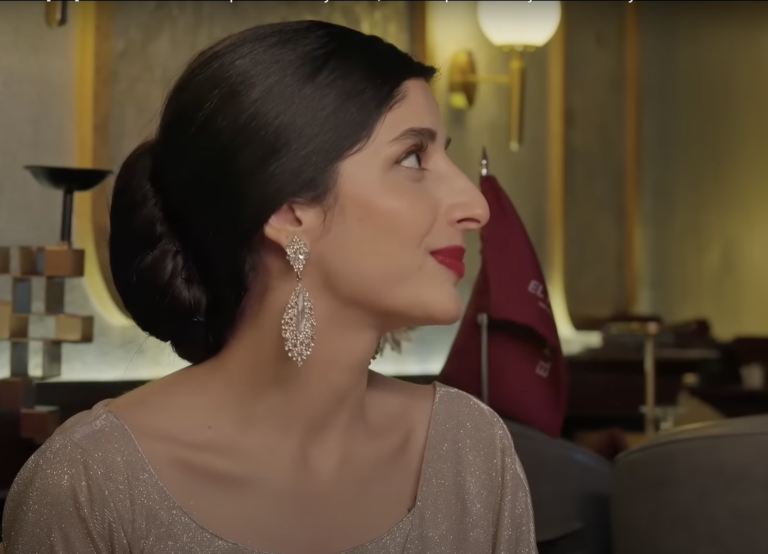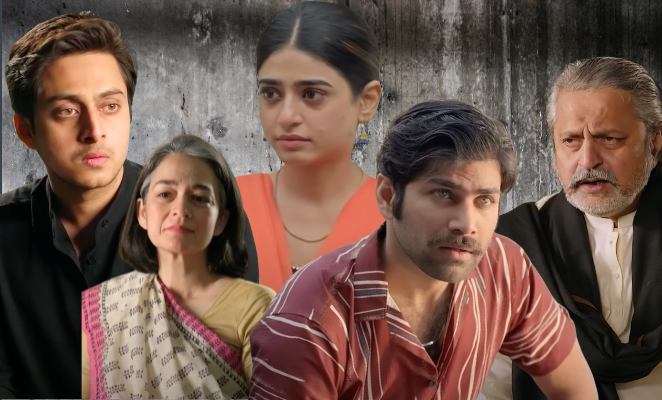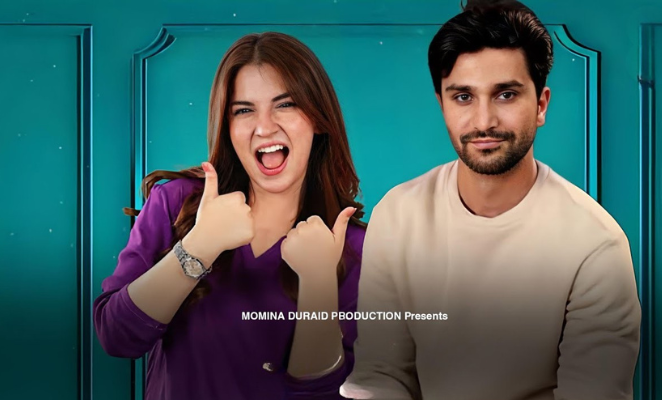Faida…? Mujhe to hameeshan nuksaan hua hai.
Shohar ko doosri aurat lay gayee.
Betay ko nafrat lay gayee.
Aur beti, beti ko betay lay gaya.
What do you call regret when it constantly surrounds you? What do you call loss which is recurring? What do you call the pain that permeates every inch of your being – physical and mental? For the few last weeks, I’ve been trying to make sense of Firaaq’s underlying themes. It was quickly clear that Firaaq was about relationships, moments, and freedom, but it is also equally if not more so about confrontation.
Maa-jee and Shams, Shams and Sara, Paiman and Sara, Shams and Paiman; it’s as though iss family ka har shaqs is at loggerheads with the other. If a few can’t get over the past, then, some are afraid of what the future might hold. Stuck somewhere between the past and the future, they refuse to live for the present. With the exception of Paiman and Haider, none of the other individuals of this truly “psychotic” family is willing or even trying (for that matter) to embrace the here and now – not Maa-jee, not Shams, not Sara, which is why I think it’s easy to relate with Paiman.
What is surprising, though, is that the moment Paiman leaves her mother’s house she has the world at her feet – a handsome suitor, another handsome mentor (for lack of better word), a forgiving mother, confidence (and copious amounts of it), not to mention inner strength. Now, I’ve always imagined Paiman to be strong, for truly, the weak willed can’t survive a mother like Tabassum, but the velocity with which her change is portrayed makes it somewhat unbelievable. Perhaps, gradual progression would have eased the viewer in as well as allowing fluidity to the narrative. Instead, we’re bombarded with Paiman confronting Sara’s harkats and Shams dhamkiyan.
Sara’s unwillingness to confront her demons is evident in her elaborate and byzantine intrigues. Why is she so scared? What secrets lie buried here? If Sara is a case-study in cray-cray (and mohabbat is also a form of pagalpaan khas kar ki for a person like Shams), then, Rumi, her champion and BFF is the sanest voice around. Did you ever think Khizer from Humsafar could be capable of unbiased and reasonable advise? I confess, I did, I’ve always known Noor Hassan to be a good actor and with his recent forays into difficult roles like Shanakht, Garr Maan Rahe Jaye, and Firaaq, I can see his versatility.
With one confrontation and another conversation down, I wonder, like Paiman, “Har koi ek doosray say kyun chup raha hai?”
Chupta-chupatay we reach the climax and what a climax it was. Shams and Paiman was just the beginning, the best was yet to come! I’ve said this before and I’ll say it again, I find Shams’ motives very iffy. Why is he all of a sudden the good baday bhaiya? Why now? He could have gone back for Paiman ages ago, yet, he never did.
I find, Shams is as much Tabsassum’s son as she is his mother – they’re both controlling creatures! And good on Paiman to burst his bubble and walk out. Kudos! Sanam Saeed is in her element here, in a role she does very, very well. I’m wondering if there’s more I’ll see from her or is it just full stop at “angry young woman” for now. Seeing her walk out as Sara pleads was where the last six episodes have been building up to, but those that walk out must at some point walk in, and this is why I’m a little concerned for Paiman. As Sara rightly noted, does she really want to go against her family and be without their support? This is where I see Rumi’s character fitting in, as Paiman’s support system, but I might be completely wrong! Jatay-jatay Paiman gives baday bhai a lesson or two in appreciating those that love him lest they walk out too. Someone has Sara’s back, it seems.
Paiman leaving was but one significant event, the other was Maa-jee’s realization that Shams no longer has her daughter.
Week after week Uzma Gillani continues to grow from strength to strength. Her and Syed Mazhar Ali are the two reasons that bring me back every Saturday. Uzma sahiba, aap ka naam maine pehli baar Aangan Tehra ki ek kisht mein suna tha jab Shakeel saab kay character Mehboob Ahmed ki saas apni beti, Jahanara Begum (jo Bushra Ansari ka character tha), ko kehti hain: “Mein Uzma Gillani, Rohi Bano adakara nahi hoon jo award ki umeed rakhoon.” Waqai aaj samajh gaya ki aap har award kay kabil hi nahi balki deserving bhi hain. Aap ko HUM TV award day na day iss na cheez nay aap ki adakari ko dekha, pehchana, aur bahut appreciate kara! Aapka bahut, bahut shukriya for playing this character. Dil say aap ko salaam, maan gaye.
Every time Maa-jee is on screen with Shams, it is literally fire! These are both similar personalities – stubborn to the core, unwilling to forgive or forget – that clash on matters fundamental: principles, aasool. Aaj bhanda phoor kar hi diya Maa-jee, and why should she live with the guilt? Why should she live with the anger? Whatever overarching storyline the marhoom Aabaji has to play, I’m glad to see that Maa-jee is willing to make amends, to look beyond her anger, and is not scared to confront the truth.
Often times, though, with confrontation comes regret and I wonder if that’s where we’re headed.
Until next week,
Rab Rakha
This is RB signing off. (Tweet me!)
P.S. An excellent episode in terms of pacing. If the direction was crisp, the editing crisper, and the writing, well, Subha’Allah.










 Saim
Saim 

 Naqsh begins today, taking over the Faraar tim
Naqsh begins today, taking over the Faraar tim


